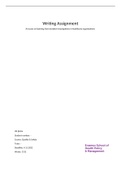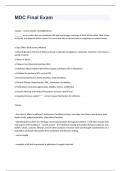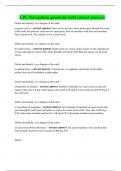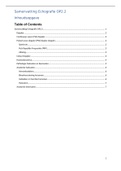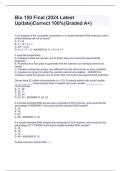Writing Assignment
An essay on learning from incident investigations in healthcare organizations
JM Ijlstra
Student number: -
Course: Quality & Safety
Tutor: -
Deadline: 4.11.2022
Words: 1132
, Introduction
Sentinel events, also known as adverse events, are inevitable let alone unintentional safety events
within healthcare organizations (Mathebula et al., 2022; Rafter et al., 2016). These events cause
serious complications such as death, or loss of function resulting in the inability to function normally
(Urden et al., 2009). In the Netherlands, healthcare organizations must report sentinel events, which
are then investigated by the Healthcare Inspectorate (IGZ) in cooperation with the patient and their
family (Leistikow et al., 2016). This essay aims to clarify how healthcare organizations learn and how
learning is influenced. Giving rise to the research question this essay is intended to investigate: “How
do incident investigations influence the learning process of quality and safety within healthcare
organizations?”
Conceptual framework
Bate et al. (2007) conceptualized seven quality improvement challenges, one of which was the
educational challenge. This challenge entails generating and supporting a learning process to
reinforce improvements within an organization.
Learning organizations continuously acquire knowledge in order to improve and transform
quality and safety processes (Marsick & Watkins, 1999). Learning can be achieved through single-
and double-loop learning (Argyris, 1977). Within single-loop learning an organization merely corrects
strategies, while continuing its usage of current policies and goals, to solve a problem. In contrast,
the latter learning process reevaluates policies, goals, and values, before evaluating strategies.
According to Clegg et al. (2005), organizational learning is a process of ‘becoming’, which describes
the motion between then and now, a dynamic movement that is characterized as a journey without
a fixed route. Learning is not easily manageable; requiring individuals and organizations to abandon
dominant concepts and deframing them.
Ex post theory is argued to be a useful tool for organizational learning, in which an
evaluation of an implemented strategy is made to analyze what provoked an event (Dixon-Woods et
al., 2011). Dixon-Woods et al. (2011) explain that a problem is recognized within quality
improvement programs when the problem is perceived as legitimately being a problem. In other
words, an incident may be perceived as a problem by one individual, while it may not be perceived
as such by another.
Fricker (2009) and Carel and Kidd (2014) extend this theory by defining epistemic injustice:
as unfair treatment relating to the communication and understanding of knowledge between
clinicians and patients. To rephrase this, epistemic injustice can be seen as the identification of one's
knowledge as being inferior to that of another. Epistemic injustice can be differentiated into two
An essay on learning from incident investigations in healthcare organizations
JM Ijlstra
Student number: -
Course: Quality & Safety
Tutor: -
Deadline: 4.11.2022
Words: 1132
, Introduction
Sentinel events, also known as adverse events, are inevitable let alone unintentional safety events
within healthcare organizations (Mathebula et al., 2022; Rafter et al., 2016). These events cause
serious complications such as death, or loss of function resulting in the inability to function normally
(Urden et al., 2009). In the Netherlands, healthcare organizations must report sentinel events, which
are then investigated by the Healthcare Inspectorate (IGZ) in cooperation with the patient and their
family (Leistikow et al., 2016). This essay aims to clarify how healthcare organizations learn and how
learning is influenced. Giving rise to the research question this essay is intended to investigate: “How
do incident investigations influence the learning process of quality and safety within healthcare
organizations?”
Conceptual framework
Bate et al. (2007) conceptualized seven quality improvement challenges, one of which was the
educational challenge. This challenge entails generating and supporting a learning process to
reinforce improvements within an organization.
Learning organizations continuously acquire knowledge in order to improve and transform
quality and safety processes (Marsick & Watkins, 1999). Learning can be achieved through single-
and double-loop learning (Argyris, 1977). Within single-loop learning an organization merely corrects
strategies, while continuing its usage of current policies and goals, to solve a problem. In contrast,
the latter learning process reevaluates policies, goals, and values, before evaluating strategies.
According to Clegg et al. (2005), organizational learning is a process of ‘becoming’, which describes
the motion between then and now, a dynamic movement that is characterized as a journey without
a fixed route. Learning is not easily manageable; requiring individuals and organizations to abandon
dominant concepts and deframing them.
Ex post theory is argued to be a useful tool for organizational learning, in which an
evaluation of an implemented strategy is made to analyze what provoked an event (Dixon-Woods et
al., 2011). Dixon-Woods et al. (2011) explain that a problem is recognized within quality
improvement programs when the problem is perceived as legitimately being a problem. In other
words, an incident may be perceived as a problem by one individual, while it may not be perceived
as such by another.
Fricker (2009) and Carel and Kidd (2014) extend this theory by defining epistemic injustice:
as unfair treatment relating to the communication and understanding of knowledge between
clinicians and patients. To rephrase this, epistemic injustice can be seen as the identification of one's
knowledge as being inferior to that of another. Epistemic injustice can be differentiated into two


